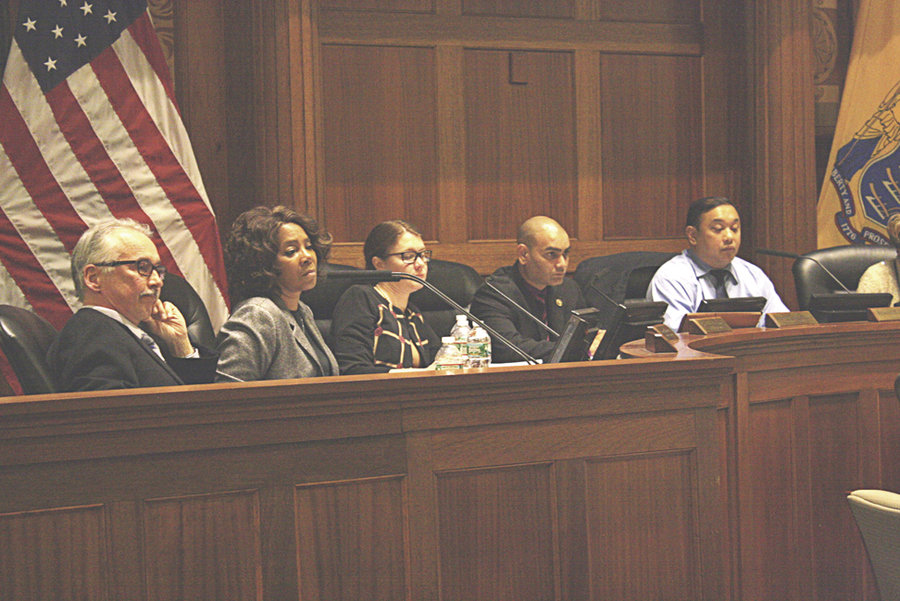A divided Jersey City Council adopted an ordinance at its Jan. 13 meeting that would put a binding referendum on the November ballot to decide if municipal elections should be moved from May to November in time for the 2017 mayor and gubernatorial elections.
The vote will be a repeat of a non-binding referendum that voters narrowly approved last fall. Bending to criticism that the 52 to 48 percent passage of the non-binding referendum did not signify a mandate for change, the council chose to advance a binding referendum instead.
While the measure would not do away with runoff elections, Mayor Steven Fulop said last month he intends to propose a second ballot question that would.
The referendum will occur during a high turnout presidential election. If voters approve it, the municipal elections will move from May to November 2017.
This will have the effect of allowing Fulop to try to get the Democratic primary nomination for governor in June, and if he fails, to still run for mayor.
Opponents of the referendum argue that the ballot would be too confusing if candidates for mayor and council are added to the already substantial list of candidates in November elections.
“The more people who turn out the better.” – Frank Gajewski
____________
May elections were part of a series of political reforms done in 1947 when the state updated its constitution, in order to reduce the sway of political parties over non-partisan municipal elections.
Partisan control over local elections was seen as a problem during the era of then-Mayor Frank Hague. May elections also kept municipal elections from being swept up in some popular national issue and allowed voters to focus on local issues instead.
Will the change create more confusion?
Before casting his vote, Ward A Councilman Frank Gajewski defended the move, saying that low turnout in May elections allows specific political factions to control the outcome better.
“The more people who turn out the better,” Gajewski said, noting that in November more people will come out to vote than in May.
But Yvonne Balcer, one of the leading opponents of the move, said moving the election would blur the line between partisan and non-partisan elections. She cited confusion two years ago when the Board of Education moved its elections to November, when some of the candidates lined up on the same ballot line as those running on a political ticket did better than expected.
Council President Rolando Lavarro conceded that the first year was a problem in that way, but said the issue had been corrected since, and would not be a problem for the municipal election.
Lavern Washington, a resident from Ward F, said many people in her part of the city are already confused by the expanded ballot, and that the change would only make things worse.
“If everything is done in November, there will be too many choices,” she said. “There are no classes on how to vote. With this, you’re mixing apples and oranges [meaning partisan and non partisan elections].”
Hoboken was a success story
Although some council members used Hoboken’s change of election from May to November as a success story, Councilman Michael Yun said Jersey City is not Hoboken and the number of candidates on the ballot will cause confusion and slow down the voting process.
“People need to know who they are voting for,” Yun said. “Many people won’t understand.”
Councilwoman Candice Osborne, however, said confusion can be minimized by properly designing the ballot.
“I think people in Jersey City are smart enough to figure it out,” she said. “We want to increase the number of people who come out to vote. Moving the election will do that.”
Will this help Fulop in 2017?
Scott Gawrych, a resident speaking at the public hearing on the ordinance, said the council’s move was designed to help Mayor Fulop with his political aspirations.
“This is Mayor Fulop’s back up plan,” Gawrych said. He called the City Council “a puppet council.”
“If the council wants more people to turn out to vote, then they should better engage the public,” Gawrych said.
Gajewski disputed this claim, saying this was not about Fulop; it was about a promise Fulop and many of the council members made back when they ran in 2013.
“This is about getting more people to vote,” he said.
Although less vehement in his objection to the ordinance, former City Attorney Bill Matsikoudis wanted the council to include an explanation on the ballot as to when runoff elections would take place if the election is moved from May to November. Runoffs occur when more than two candidates run and none commands more than 50 percent of the vote.
Matsikoudis as a private attorney has been representing residents opposed to the move, and is aware that Fulop intends to do away with the runoffs as well.
But the council asked current City Attorney Jeremy A. Farrell to determine if adding an explanation on the ballot is legal. Farrell said that the current ordinance meets state requirements which do not include such an explanation.
Al Sullivan may be reached at asullivan@hudsonreporter.com.
